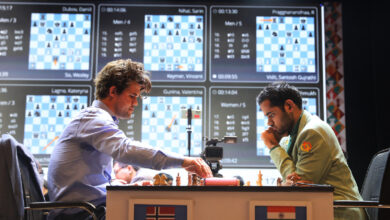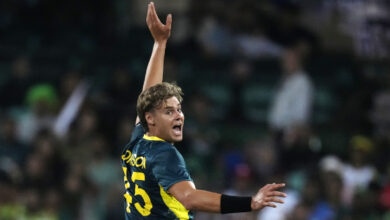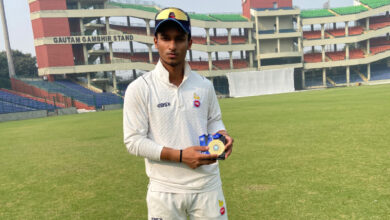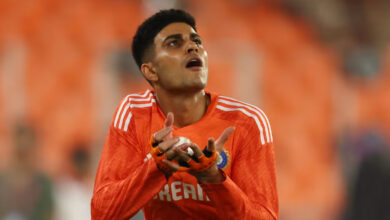SL 2016: Kerala Blasters’ stout defence did just enough to pip Delhi Dynamos in semi-final 2nd leg

It was another epic encounter between Kerala and Delhi – two rivals miles, cultures and demographics apart. It featured some of the best and the worst traits of football itself, and at the end of it, the man who had consigned Kerala to defeat in the inaugural edition of the Indian Super League (ISL) held his arms aloft, this time guiding them to the final to lay another siege on the trophy.
Kerala have made their second final in three years, and will line up on Sunday against Atletico de Kolkata looking to heal an old wound. This isn’t just a battle for a trophy; it is for lost pride and also for a place in Indian football culture, a culture that has cruelly picked one fandom over another.
Kerala Blasters players during their semi-final 2nd leg clash with Delhi Dynamos . ISLKerala Blasters players during their semi-final 2nd leg clash with Delhi Dynamos . ISL
For over an hour of the match though, Kerala’s fans, much like their players on the pitch, were silent, laboriously enduring whatever the opposition was throwing at them. Delhi were down to ten men, but were still the team looking more likely to score. It is hard to think of a real occasion when the Blasters threatened Antonio Doblas’ goal, after Duckens Nazon’s brilliant equaliser.
Maybe Kerala coach Steve Coppell knew something we don’t. Maybe he orchestrated the whole thing perfectly. The Blasters sat back, often deep, with five men in a flat line forming their defence, and the only occasions they ventured forward, they did so with direct long, hopeful balls, the kind of deliveries that would be acceptable if you were aiming them at Jan Koller (the nearly seven feel tall former Czech Republic forward), and not CK Vineeth.
If Coppell had a plan, he may have considered letting the fans in on it. It would’ve been kind. In the first half hour of play, you couldn’t really tell if Delhi were playing at home or away. An entire tier was a sea of yellow. It is true when they say Malayalis are everywhere – for the first half hour of play on Wednesday, they were at the Jawaharlal Nehru stadium in Delhi.
It was then that Coppell’s larger plan seemed to have discovered its largest loophole – Sandip Nandy. There were eight minutes of injury time at the end of the first half. Such a long period of stoppage time is unheard of, and right at the end of it, came Delhi’s second goal. Nandy came out to punch a looping free kick, and only added to Kerala’s messy man marking in the box.
Sandesh Jhingan would pull off goal line heroics to save the Blasters in the second half, but in the first, he couldn’t save them. The Blasters would now be forced to come out and play more freely, everyone thought. This was finally a match of equals, if not on the field, at least on the scoreboard.
Surprisingly though, they didn’t. Coppell made all the right substitutions. Off went Boris Kadio and on came Kervens Belfort, but Delhi’s barrage was unstoppable, led by their sniper in the No 10 role, Florent Malouda.
It was hard to control him, and almost single-handedly, he gave Delhi voice, not just on the pitch but also off it. Each touch was cheer-worthy, as he twisted, turned and constantly ran into the box, surrounded at several times by a wall of yellow. And almost each time, he pulled off a pass, cross or shot. He was prolific through the season in invisible ways, pulling the strings that set Marcelinho and Richard Gadze free. Against the Blasters he was in his element.
However, for all their brilliance and style, Gianluca Zambrotta’s men have lacked substance when it mattered and have underachieved. This is hard to understand. Kerala, on the other hand, have been more pragmatic, and have always looked to do the dirty work right, and get the results that mattered. And yet, Delhi had only ever lost to Kerala once, way back in 2014, by a single goal margin at home.
This was probably their best opportunity to break that run, facing a ten-man Delhi desperately looking for a win, but somehow, they did just the opposite. Kerala would have accepted losing this match, but not the semi-final.
None of the substitutions mattered though. Mohammad Rafique for Mohammed Rafi was forced by injury. Belfort hardly had time on the ball to be of any influence, and Nazon for Antonio German went awry (on another day it would have been disastrous).







